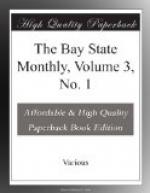He landed at Newbury, settled first in Salisbury, and ferried people across the Merrimack between Salisbury and Newbury. His wife, Dionis, brewed beer for thirsty travellers. The Sheriff had her up before the courts for charging more per mug than the price fixed by law, but she went scot free on proving that she put in an extra amount of malt. We may think of the grave and reverend Justices ordering the beer into court and settling the question by personal examination of the foaming mugs,—smacking their lips satisfactorily, quite likely testing it a second time.
Tristram Coffin became a citizen of Newbury and built a house, which is still standing. In 1660 he removed with a portion of his family to Nantucket, dying there in 1681, leaving two sons, from whom have descended all the Coffins of the country—a numerous and widespread family.
One of Tristram’s decendants, Peter, moved from Newbury to Boscawen, New Hampshire, in 1766, building a large two-storied house. He became a prominent citizen of the town—a Captain of the militia company, was quick and prompt in all his actions. The news of the affair at Lexington and Concord April 19,1775, reached Boscawen on the afternoon of the next day. On the twenty-first Peter Coffin was in Exeter answering the roll call in the Provincial assembly—to take measures for the public safety.
His wife, Rebecca Hazelton Coffin, was as energetic and patriotic as he. In August, 1777, everybody, old and young, turned out to defeat Burgoyne. One soldier could not go, because he had no shirt. It was this energetic woman, with a babe but three weeks old, who cut a web from the loom and sat up all night to make a shirt for the soldier. August came, the wheat was ripe for the sickle. Her husband was gone, the neighbors also. Six miles away was a family where she thought it possible she might obtain a harvest hand. Mounting the mare, taking the babe in her arms, she rode through the forest only to find that all the able-bodied young men had gone to the war. The only help to be had was a barefoot, hatless, coatless boy of fourteen.
“He can go but he has no coat,” said the mother of the boy.
“I can make him a coat,” was the reply.
The boy leaped upon the pillion, rode home with the woman—went out with his sickle to reap the bearded grain, while the house wife, taking a meal bag for want of other material, cutting a hole in the bottom, two holes in the sides, sewing a pair of her own stockings on for sleeves, fulfilled her promise of providing a coat, then laid her babe beneath the shade of a tree and bound the sheaves.
It is a picture of the trials, hardships and patriotism of the people in the most trying hour of the revolutionary struggle.
The babe was Thomas Coffin—father of the subject of this sketch, Charles Carleton Coffin, who was born on the old homestead in Boscawen, July 26, 1823,—the youngest of nine children, three of whom died in infancy.




